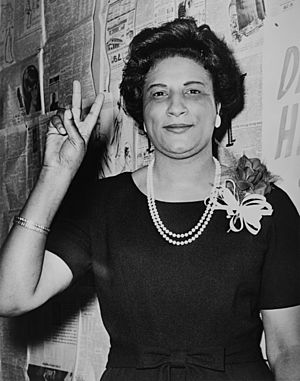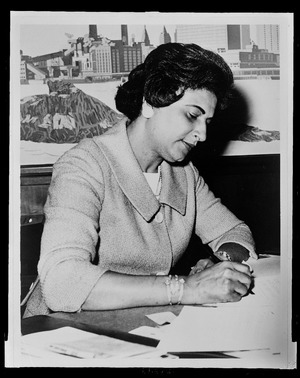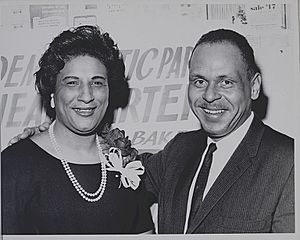Constance Baker Motley facts for kids
Quick facts for kids
Constance Baker Motley
|
|
|---|---|

Motley in 1964
|
|
| Senior Judge of the United States District Court for the Southern District of New York | |
| In office September 30, 1986 – September 28, 2005 |
|
| Chief Judge of the United States District Court for the Southern District of New York | |
| In office May 31, 1982 – September 30, 1986 |
|
| Preceded by | Lloyd Francis MacMahon |
| Succeeded by | Charles L. Brieant |
| Judge of the United States District Court for the Southern District of New York | |
| In office August 30, 1966 – September 30, 1986 |
|
| Appointed by | Lyndon B. Johnson |
| Preceded by | Archie Owen Dawson |
| Succeeded by | Kimba Wood |
| Borough President of Manhattan | |
| In office February 23, 1965 – August 30, 1966 |
|
| Preceded by | Edward R. Dudley |
| Succeeded by | Percy Sutton |
| Member of the New York Senate from the 21st district |
|
| In office February 4, 1964 – February 23, 1965 |
|
| Preceded by | James Lopez Watson |
| Succeeded by | Jeremiah B. Bloom |
| Personal details | |
| Born |
Constance Baker
September 14, 1921 New Haven, Connecticut, U.S. |
| Died | September 28, 2005 (aged 84) New York City, U.S. |
| Political party | Democratic |
| Spouse |
Joel Motley Jr.
(m. 1946) |
| Children | 1 |
| Education | |
Constance Baker Motley (born Baker; September 14, 1921 – September 28, 2005) was an amazing American judge and politician. She served as a judge in the United States District Court for the Southern District of New York.
Motley was a key leader in the Civil Rights Movement. She worked to end unfair treatment based on race. Before becoming a federal judge, she was a state senator and the Borough President of Manhattan in New York City.
After getting her law degree in 1946, she joined the NAACP Legal Defense and Educational Fund. She worked there for over twenty years. She was the first Black woman to argue a case at the Supreme Court. She argued 10 important civil rights cases and won nine of them. She also worked as a law clerk for Thurgood Marshall, helping him with the famous Brown v. Board of Education case.
Motley was also the first African-American woman appointed to the federal court system. She served as a United States district judge. In 1965, she became the first woman to be elected Borough President of Manhattan. In this role, she helped create a plan to improve areas like Harlem. She secured $700,000 to help these neighborhoods.
| Top - 0-9 A B C D E F G H I J K L M N O P Q R S T U V W X Y Z |
Early Life and Inspiration
Constance Baker was born on September 14, 1921, in New Haven, Connecticut. She was the ninth of twelve children. Her parents, Rachel Huggins and McCullough Alva Baker, were immigrants from the Caribbean island of Nevis. Her mother was a seamstress and teacher before coming to the U.S. Her father was a chef for student groups at Yale University.
Motley's mother, Rachel Baker, was a community activist. She even started the NAACP chapter in New Haven. When Constance was 15, she read books by James Weldon Johnson and W.E.B. DuBois. This made her very interested in Black history and civil rights. She realized there weren't many Black lawyers fighting for justice.
Education Journey
While in high school, Motley was a leader in youth and community groups. She graduated with honors from Hillhouse High School in 1939. She wanted to be a lawyer but didn't have money for college. She worked for the National Youth Administration and stayed involved in her community.
A local businessman, Clarence W. Blakeslee, heard her speak. He was so impressed that he offered to pay for her education. With his help, she went to Fisk University in Nashville, Tennessee. After a year, she moved to New York University, where she earned a degree in economics in 1943. She then got her law degree from Columbia Law School in 1946.
In 1945, while still in law school, she was hired by Thurgood Marshall. He later became a Supreme Court Justice. She helped him with cases related to court martial after World War II.
Fighting for Civil Rights
Motley is known as a very important person in the Civil Rights Movement. After law school, she joined the NAACP Legal Defense and Educational Fund (LDF). She was the first woman lawyer to work there. She became a lead attorney in many early civil rights cases. She represented important figures like Martin Luther King Jr. and the Freedom Riders. She even visited Martin Luther King Jr. in jail.
In 1950, she wrote the first legal complaint for the Brown v. Board of Education case. This case led to the end of segregation in public schools. She was the first African-American woman to argue a case before the U.S. Supreme Court. In 1962, she won the Meredith v. Fair case. This allowed James Meredith to be the first Black student at the University of Mississippi.
Motley won nine out of ten cases she argued at the Supreme Court. The tenth case was later overturned in her favor. She was a key legal thinker in the movement. She helped end segregation in schools, buses, and lunch counters across the South.
Beyond her legal work, Motley continued her civil rights efforts as an elected official. In 1964, she was elected to the New York State Senate. There, she worked for fair housing for low-income Black and Latino families. She also supported projects to improve neighborhoods in New York City.
Breaking Barriers in Politics and Law

On February 4, 1964, Motley was elected to the New York State Senate. She was the first African American woman to serve in the State Senate. She resigned from this role on February 23, 1965. This was because she was chosen as the first woman Manhattan Borough President. She was then elected to a full four-year term in November 1965.
Becoming a Federal Judge
President Lyndon B. Johnson nominated Motley to be a judge on the United States District Court for the Southern District of New York in January 1966. Senator James Eastland tried to delay her approval for seven months. He was against her past work fighting segregation. He even accused her of being a Communist.
Despite this opposition, the United States Senate confirmed her on August 30, 1966. She became the first African American female federal judge. She served as Chief Judge from 1982 to 1986. She continued to serve until her death on September 28, 2005.
Important Cases as a Judge
As a judge, Motley handled many important cases. In Blank v. Sullivan & Cromwell, a law firm was accused of treating women unfairly. Some people thought Motley should not hear the case because she was a woman and Black. But she showed her fairness by pointing to her past decisions. She sometimes ruled against people in discrimination cases.
In another case, Motley criticized the New York City police. She said they did not protect Vietnam War protesters enough from violence.
In 1978, Motley made a big decision for women in sports. She ruled that a female reporter must be allowed into a Major League Baseball locker room. This was in the case of Ludtke v. Kuhn. Melissa Ludtke sued because the New York Yankees would not let female reporters into their locker room.
Honors and Awards
Motley received many awards for her important work:
- In 1984, she received a Candace Award for Distinguished Service.
- In 1993, she was added to the National Women's Hall of Fame.
- In 2001, President Bill Clinton gave her the Presidential Citizens Medal.
- In 2003, the NAACP gave her the Spingarn Medal, their highest honor.
- In 2006, after she passed away, she received the Congressional Gold Medal. This is one of the highest civilian awards in the U.S.
- In 2011, she was honored with the 13th Ford Freedom Award.
Her former home in Chester, Connecticut was named the “Judge Constance Baker Motley Preserve” in 2016. In 2019, this property was recognized as a site on the Connecticut Freedom Trail. A street in Harlem, New York City, was also co-named “Constance Baker Motley Place” to honor her.
Personal Life
Constance Baker married Joel Motley Jr. in 1946. He was a real estate and insurance broker. They lived in Harlem, New York City. They also had a second home in Chester, Connecticut.
They were married for 59 years. Constance Baker Motley passed away on September 28, 2005, from heart failure. She was 84 years old. Her funeral was held in Connecticut. A public memorial service was held in Manhattan. She had one son, Joel Wilson Motley III, and three grandchildren.
Lasting Impact
Constance Baker Motley's work continues to inspire many people. She reached out to other African-American women judges. For example, she sent a personal note to Judge Ann Thompson when she was appointed.
The University of Pennsylvania Law School holds writing competitions in her honor. Melissa Ludtke, the reporter from the locker room case, has praised Motley's work. Judith Heumann, a disability rights activist, credits Motley for helping her become the first licensed teacher in New York who used a wheelchair.
U.S. Vice President Kamala Harris has said Motley influenced her own career. Federal judge Ketanji Brown Jackson also cited Motley as an inspiration. Jackson and Motley even share the same birthday.
Several documentaries have been made about her life. These include Justice is a Black Woman: The Life and Work of Constance Baker Motley (2012) and The Trials of Constance Baker Motley (2015). In 2022, a biography called Civil Rights Queen was published about her.
See also
- List of African-American jurists
- List of first women lawyers and judges in the United States
 | Percy Lavon Julian |
 | Katherine Johnson |
 | George Washington Carver |
 | Annie Easley |


